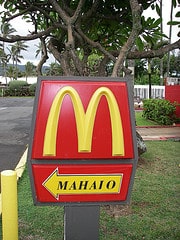 When visiting a new place, we all want to be polite visitors, don’t we? Every culture seems to have its own set of etiquette rules and Hawaii is no exception.
When visiting a new place, we all want to be polite visitors, don’t we? Every culture seems to have its own set of etiquette rules and Hawaii is no exception.
Now, before we get started, I want to emphasize that you’re not going to have to walk on eggshells or really worry about what you do and say. I think that you’ll find that most of these etiquette suggestions are common sense and apply across the world, however you’ll probably find some that other suggestions are somewhat unique to Hawaii. Either way, these suggestions aren’t difficult to follow.
- Learn to use the words aloha and mahalo with sincerity. Aloha (pronounced “ah lo hah”) has several meanings, but as a visitor, you will most likely use it for saying hello and goodbye. Mahalo (pronounced “muh hah lo”) means thank you. These are beautiful words that you will soon learn to love. Many of Hawaiian vowels are pronounced differently than on the mainland. It would be helpful to read and try to remember the basic overview of the Hawaiian alphabet. Most towns and street names are in Hawaiian, so if you become familiar with the basic pronunciation, you’ll be able to attempt to say those names as best you can. If you want more, see our article listing Hawaiian words to know for your Hawaii vacation.
- If you are presented with a lei, always accept and wear it with gratitude. Never take the lei off in the presence of the person who gave it to you. (Hint: if the lei is irritating to your neck, center it on your shoulders so that half lays in front and half on your back.) If you are an expectant mother, you may be given a different lei that has an open end. The open ended lei is intended to encourage a safe delivery.
- If you are invited into someone’s home, always remove your shoes before entering the home.
- If you are on a sightseeing drive and you notice a local driver in your rear view mirror, pull off the road at your earliest opportunity to let the local person pass. They know the roads and scenery like the back of their hands and can go at a faster pace than you.
- Don’t bring any fresh flowers, fruits, vegetables, etc to Hawaii as they could be harmful to Hawaii’s farms and environment. Any plants or animals brought into Hawaii must be declared and inspected upon arrival. So that you’ll be ready for that process, read Be Prepared to Complete the Hawaii Agricultural Declaration Form.
- Don’t damage the coral by touching it or stepping on it.
- Don’t approach sea turtles, monk seals or humpback whales. They’re all endangered species and protected by law.
- Don’t take any lava rocks or sand.
- Be respectful of others particularly at historic or religious sites.
- Respect private property. All beaches in Hawaii are open to the public, but that doesn’t mean you can traipse across someone’s yard to reach the beach. Use the public beach access.
- If you see a sign that says Kapu, that means that it is forbidden.
- Always pick up and properly dispose of your garbage.
- Never honk your horn in traffic unless it is an absolute emergency.
- As a courtesy, it is always a good idea to let older people or mothers with young children go a head of you in a line.
- Understand that hula is far more than just a dance to entertain tourists. B.N. Sullivan says, “hula is much more to those of us who live here, whether we are of ethnic Hawaiian ancestry or not. It is a central, and in some ways sacred, expression of local culture and tradition… If you are lucky enough to get invited to a local wedding or other celebration, or if you happen on a club or restaurant where locals gather and there is live music, you’ll see people spontaneously get up and dance hula when they hear one of their favorite pieces played. I mean young people, old people, women, men, little kids, grannies, aunties, uncles and so on. Do NOT snicker. This is the real deal! Count yourself lucky to see it.”
- In Hawaii there is a local language/dialect called “Pidgin“. For example the word hello may end up sounding like “ho brah”. It is unlikely that visitors will hear much pidgin while visiting Hawaii, so please don’t get too hung up on this one. From my many visits to the islands, I’ve only heard it spoken between friends on rare occasions or on the radio. Some locals recommend that it’s best that visitors don’t attempt to speak pidgin to the locals as it might accidentally irritate them. Do not assume that someone you overhear speaking pidgin is stupid, illiterate or uneducated. Most locals are actually “bilingual”, in a sense that they speak perfect English as well as pidgin. (Added by Dave and B.N. Sullivan)
In my many trips to Hawaii, I’ve encountered some wonderfully friendly people. The spirit of aloha does indeed exist. For example, a security guard we met on Oahu was so friendly and helpful when we were lost and thirsty in the the hot sun. He had no reason to help us, but he went out of his way to help. He even offered us a cold bottle of water from his own lunch box. We were really blown away with his generous aloha spirit.
I hope that you will encounter the aloha spirit on your Hawaii vacation. There’s a good chance you will. So, bring your smile and practice up on saying aloha and mahalo and you’ll have a great time!

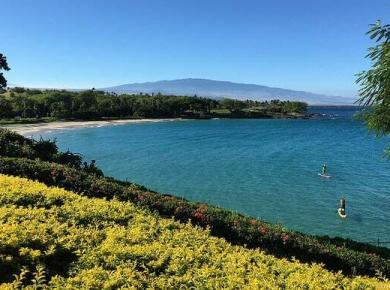
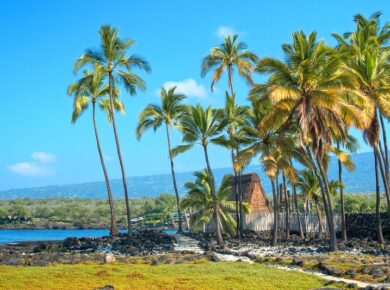
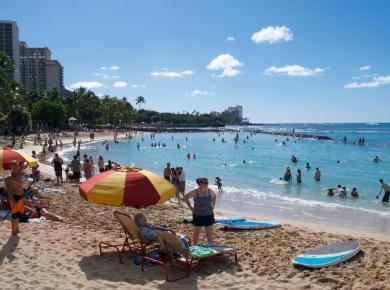
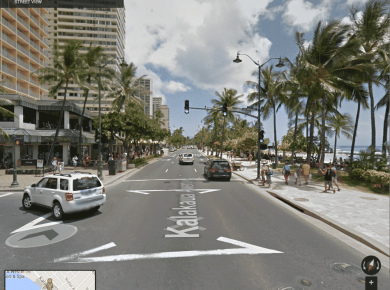
30 comments
Aloha Sheila,
I am a local girl living on the Big Island. This tip is for visitors and people who live in Hawaii. Pick up your opala! Meaning, pick up your trash! It pains me to see beautiful hiking trails, beaches, look out points, parks etc. littered with garbage or rubbish left by thoughtless people.
Great advice, HawaiiVacationGifts! I’ve never understood the people who think the world is their garbage can.
These are really great rules to live by when visiting Hawaii or any other palce for that matter. Respect the locals and their way of life. You are there to observe and should blend in and not stick out like and anoying sore thumb.
These rules should be provided to all incoming visitors to Hawaii. You may want to add that it is not a good idea to honk your horn in traffic unless it is an emegency. Also, as a courtesy, it is always a good idea to let older people or mothers with young children to go ahead in a line.
When my wife was ready to have our first baby in Hawaii, she was given a lei that did not have the ends tied together to encourage a safe delivery. So in case you are expecting a baby soon in Hawaii and you receive a lei, expect to receive a lei that is a little different, but with good intentions.
Debo Hobo – I totally agree that visitors are there to observe and not to be observed!
Chris – Thanks for adding the bit about honking the horn and the significance of the open ended lei. I’m going to go ahead and add those pieces along with the advice above from HawaiiVacationGifts.
Great list of tips!
Don’t try to fake a Hawaiian or local accent.
Some locals speak their own language called “Pidgin”. Phrases like “I don’t care” come out sounding like “Ainokea” Other phrases like “Ho Brah” for hello etc… The list goes on and on. As a local, I’d recommend that visitors don’t try to pick up on this. If you try to speak pidgin to the locals, it might possibly be a bit irritating to them. The same with pronouncing Hawaii with a “V” instead of a “W” like Havaii, even though this is the correct pronunciation.
It seems like fun to pick up on some of the local expressions while on vacation but you wouldn’t go to an ethnic neighborhood at home and try to fake a Spanish or a Chinese accent so please don’t do it here with fake Hawaiian accents.
These are all great tips. The general theme is: respect! (Always a good thing, no matter where you are.)
To follow up a bit on what Dave correctly said about pidgin, do NOT assume that someone you overhear speaking pidgin is stupid, illiterate, or uneducated.
Many — maybe most — locals are “bilingual,” in a sense. They may go on in pidgin amongst themselves to an extent that is sometimes nearly incomprehensible to outsiders. Yet the same people can turn around and speak perfectly mainstream American English in a setting where that is more appropriate.
I’ll add one more — and I hope this is not too touchy.
Despite the popularized notion of hula as a form of entertainment, understand that hula is much more to those of us who live here, whether we are of ethnic Hawaiian ancestry or not. It is a central, and in some ways sacred, expression of local culture and tradition, not just something to entertain the tourists. If you are lucky enough to get invited to a local wedding or other celebration, or if you happen on a club or restaurant where locals gather and there is live music, you’ll see people spontaneously get up and dance hula when they hear one of their favorite pieces played. I mean young people, old people, women, men, little kids, grannies, aunties, uncles and so on. Do NOT snicker. This is the real deal! Count yourself lucky to see it. ;-}
I think the Polynesian Cultural Center does a great job of educating visitors on the history and tradition of the hula.
Great advice from Dave about not trying to fake “Pidgin???. It would be like visiting France and speaking English with a bad “French” accent – it just doesn’t work, so don’t even try it.
Dave & B N Sullivan – Thank you for adding those excellent points about pidgin and hula! I have updated the post with your input.
Andy – I agree that the Polynesian Cultural Center does a very good job of educating visitors about hula and other aspects of Polynesian culture.
What if one is moving to Hawaii in the near future and learning some expressions and pronunciation as a form of respect , however is only visiting at the time and practicing? What are your local thoughts on that?
Hi Robin – Are you talking about speaking pidgin or Hawaiian?
Hawaiian…I am moving in a year and I have been learning some Hawaiian (and correct pronunciation) because I respect the culture. Its one of the things I cherish about Hawaii and want to do my part in helping keep culture intact, not bring my “mainland ways” like many do. I have been visiting every 6 months for the last 10 years and it saddens me to think that others may see an attempt (in my case practice) as a negative thing. I think its better to see a respectful attempt by a haole than to see Hawaiians not learning or practicing their own language.
PS … not talking about pidgin here
Hi Robin,
I’ve lived here for about 10 years and I don’t pronounce every Hawaiian word “Properly”. Not because I don’t know how but because I find it to be a bit irritating. Whenever I hear someone pronounce the word “Hawaii” properly. (Sounds like Havaii with a V sound) it gets on my nerves.
It’s like fingernails on a chalk-board unless it’s obviously being said by a native Hawaiian who pronounces everything like that in a natural way.
Friends of mine who have taken Hawaiian Language classes don’t even speak like that except for in the classroom environment. I know several native Hawaiians who went to Hawaiian Immersion Schools and are fluent in the language don’t speak like that.
The only people I see who speak like that are the reporters on the local news. I guess they get in trouble if they say Hawaii without the V sound while on TV. It still comes across as forced and in my opinion, phony.
It’s always good to know how to properly pronounce the street names which are always Hawaiian but that’s about as far as I go.
Just be yourself. I’m sure you’re a wonderful person with a great personality. Don’t change a thing. You may come across as trying too hard.
Hi Dave – Thank you so much for that useful insight! You rock!
Thanks for the great tips. One you may want to consider is that in Honolulu, especially near Ala Moana and Waikiki, tourists take the seats on the Bus and don’t let elders sit down. This is extremely disrespectful. One antie had to get up and tell the tourists to let an older man sit down. She told me why she did it and said, “In Hawai’i we have a tradition…you get up for those who are older than you…”
Also, visitors should realize that in Hawai’i we don’t push past one another to get through a door, to enter a store, to get on a bus, or to get where we are going. M We allow the other person to go first…it is just more loving. Isn’t that what Aloha is all about anyway???
I am going to Hawaii soon for the first time and I don’t want to offend anybody. I want to experience the culture, but not irritate anybody. Because of this I will respect the suggestions to not try and speak the language or anything. However, one of the rules says to use words like Aloha and Mahalo. Are these the only words that are ok to use?
KT – Thanks for your question.
There is a a local slang/dialect called “pidgin”, where for example the term for a guy might be “brah”, which is short for brother. That’s what you should steer clear off. There’s a good chance, you may not even hear pidgin it on your vacation, so you won’t even be tempted to repeat it.
True Hawaiian words like aloha and mahalo are welcomed by the locals. Don’t worry…you’ll be fine.
Enjoy your first vacation to Hawaii!
When I was in Hawaii, I pulled over so many times to let the locals by because:
1) like you said, they know the roads;
2) I’m on vacation and driving around to enjoy the scenery, why force everyone else to enjoy it too? 🙂
man i miss hawaii 🙂
Jim – I’m sure the local folks appreciated that. Did you get a shaka from a local for being considerate?
I completely understand the feeling of missing Hawaii. It’s only been 4 days since I’ve been in Hawaii and I’m missing it already!
I’ve been to Hawaii. Met many locals and had a fabulous time. I never felt like anyone was putting any pressure on me to act a certain way. Many were amused with me when I was inquiring about pigeon. I guess I encountered the happy non- judgmental. I’m sure there have been some extremely annoying tourist and tips about customs are definitely helpful but people just like nice people. Don’t make people paranoid. Just be nice and aware of others feelings.
I did miss spell pigeon though.
I agree Revora. There’s no need for anyone to be paranoid.
This list was put together by both visitors and local residents, so there’s lots of perspectives and insight. Thanks for adding yours.
Something to keep in mind is that everyone is welcome. Even the most grouchy and arrogant people will be treated with kindness & respect.
Scott Adams (Author of Dilbert) wrote a great blog post a while back titled “The Joy of Righteous Indignation”.
http://dilbertblog.typepad.com/the_dilbert_blog/2007/03/the_joy_of_righ.html
“During my college years, I worked two summers as a desk clerk for a resort in the Catskills. That’s where my boss taught me that one of the services we offered was listening to irrational whining. He explained that certain customers enjoy complaining. To them, it’s not so much about getting a solution to the problem as it is the complaining itself. The resort catered to people’s vacation needs, and if complaining was what they needed, it was our job at the front desk to listen to it.”
“Experts say that the most loyal customers are not the ones who had a flawless experience, but the ones who had a problem that was resolved.”
It is so true… We aim to please. We sincerely appreciate people who are pleasant to be around… But… If you like to complain, that’s not a problem at all. Listening to and sympathizing with people who need to vent about stuff (even irrational stuff) a service that we are more than happy to provide.
Anyway… Just come for a visit, be yourself and enjoy.
My Family and I are heading back to Kauai & the Big Island in June. This is my 5th time and my g/f’s 8th time to the islands. My best advice for any newbie is just to be kind and courteous. Treat people how you would want to be treated and you can’t go wrong. There are many suggestions here, and many of them are good rules of thumb, but I think if read by somebody that’s has never been to the islands this could be pretty intimidating. Just have a good time, and be respectful.
I am visiting Hawaii 3rd thru 6th. I live on a huge lake in Oklahoma….my husband and I boat after summer holidays to find that people have left trash on all the beaches and islands. It is more damage to the land than people realize and can ruin the nature intended cycle. We bring huge bags with us….bag it up and leave it for lake patrol to pick up after we call them. Its so sad…some folks must not mind filthy flies.
Thanks for your reply Jamerdogg. I will be visiting Oahu for the first time in May and was really begining to wonder if I was going to have to walk on egg shells the whole time in order to keep from offending any of the locals. All of the posts that I’m reading talk about how much the locals dislike visitors to the islands. I really hope that it’s not true!
Hi Dee. 99.99% of the locals sincerely appreciate you spending your time and money to visit. The VAST majority of local folks will give visitors the benefit of the doubt.
Just about everyone shares a common goal. That goal is for you to have such a great time that you come back over and over and encourage your friends to visit as well.
As long as you treat people with respect, don’t honk the horn out of anger, don’t litter, etc… I doubt you will have any problems. Just be yourself, have fun and don’t worry about it. 😉
That being said… Unlike Disneyland – Hawaii is a real place with real people. Some of those people have real problems like personality disorders, substance abuse problems, homelessness, etc… We can’t exactly vote them off the island like the show Survivor.
You may or may not run into a person like that. I hope not. If you do… Please do your best to ignore them and don’t take it personally. Don’t let it ruin an otherwise great day.
Dave thanks for your reply. I’m happy to hear that the people of Hawaii are like people from any other highly visited area. We are looking forward to our visit in May.
I know this is a tough one, but all the tourists wearing sunscreen in the ocean is contributing to the death of the reefs near the hotels. All that zinc and aluminum oxide gets washed off into the water. Wear lightweight beach gear (you can get it at the surf shops) instead.
Mahalo
Comments are closed.